
It’s difficult to put into words just how embarrassing it felt to graduate college without a job.
I felt the weight of the world bearing down on me. The expectations of my parents, the scorn from professors, the joking behind my back from friends.
It’s not easy to make that walk of shame from college into the real world. But — I think it’s a much better move than getting roped into a cushy career path you end up hating.
At least, it worked for me.
What I didn’t know then that I know now — opting for a series of low-paying, low-status jobs while I figured out what I wanted to do proved to be the best career move I made early on.
Below, I’ve packaged all the best career advice I learned the hard way from those first 10+ years of jobs.
I used this same advice to figure out how to think about my career, to 10x my income my first 5 years out of college, and to go from unwitting, lowly college grad to the youngest member of multiple startup leadership teams — and this same advice can work for your career, too.
Best of luck.
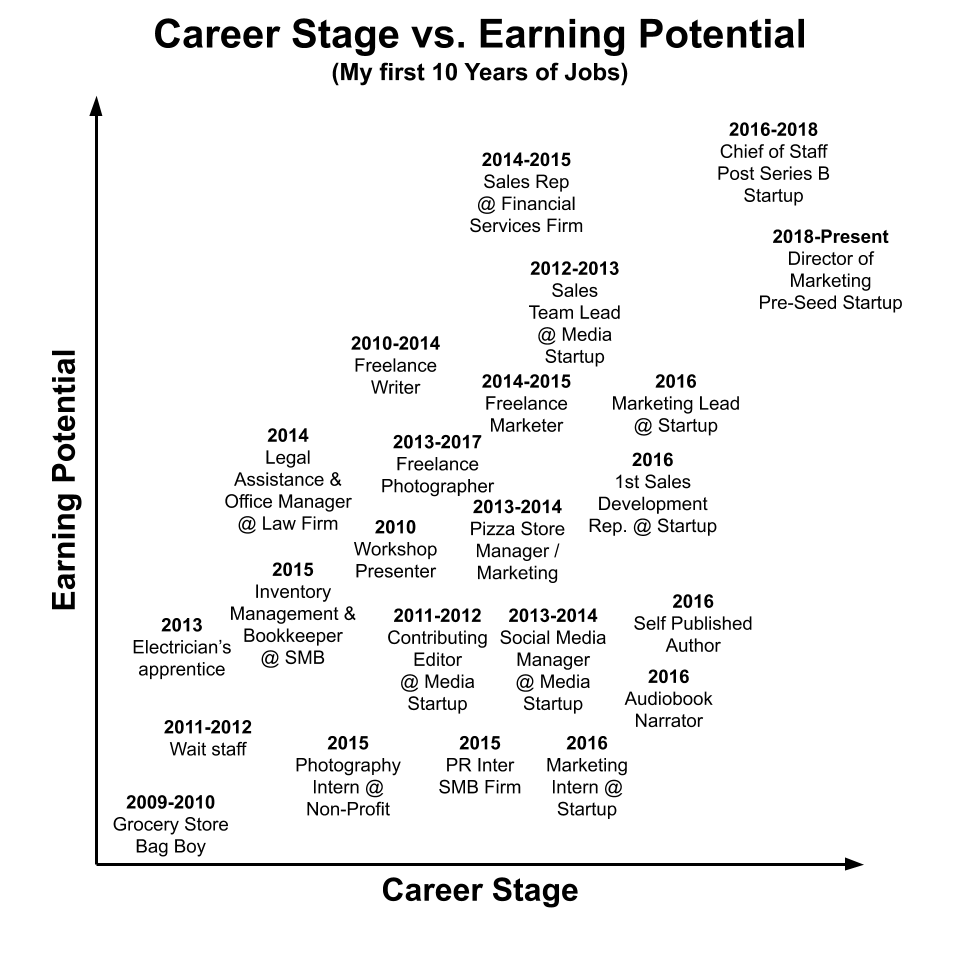
Optimize Your Early Career For Experiments, Not Earnings
When you’re early in your career, especially if you don’t know what you want, optimizing for income is maybe one of the most dangerous things you can do.
Instead, optimize your career for discovery and experimentation. In other words, don’t worry about the amount of money you make. Focus on trying as many things as possible — optimize for experience.
This benefits you in a number of ways:
First, it offers you the chance to run low-cost experiments that you can abandon anytime the results don’t pan out. Don’t like the job? No problem. Quit.
- The good thing about most entry-level positions (particularly low-paying jobs) is that turnover is already high (SHRM reports turnover as high as 49%).
- Nobody expects people to stay in these roles long. Either because they’re scraping the bottom of the labor market (read: unreliable workers) or because people (like me at that age) are taking these “gap” jobs — a job you can get quickly to pay the bills — while they work on getting a better “career” job.
Second, working lower-paying jobs offers you the chance to build a ton of social capital cheap.
- Because the bar is low in most entry-level jobs, it doesn’t take much to absolutely kick ass in a role. That means showing up early, doing everything that’s asked of you, then volunteering for more and more — and delivering results in every category.
- Not only does this help you cultivate a great reputation for being a hard worker (which will be valuable forever) but it also helps set you apart as someone who can be trusted — who’s capable of being exposed to more and more areas of the business. In other words, this is your key to getting more experience than you bargained for from that ordinary entry-level role.
Third, when you don’t optimize for income, it’s much easier for you to focus on being true to yourself.
- Forget the weight of “Keeping up with the Joneses.” You can keep your standard of living as low as you did in college (or even slightly improved) without worrying about the suddenly increased cost of living that usually follows a boost in income from a cushy decent-paying job right out of college.
In other words, your poverty and minimal expenses can be a huge advantage early because it gives you access to opportunities the need for a big income would otherwise exclude you from.
- For more on this, read about Isaac Morehouse’s “copper handcuffs” or Paul Graham’s advice for undergraduates.
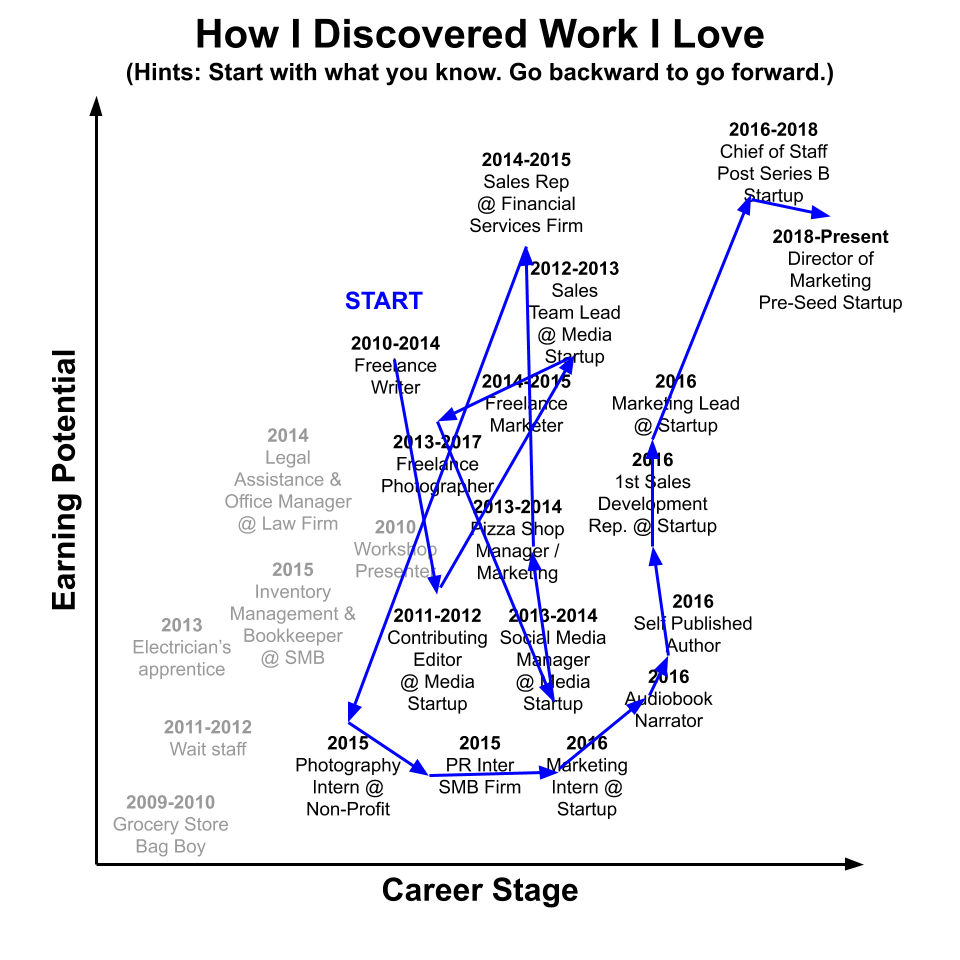
An often elusive point about working for cheap early on is that it frees you up from what I call the maintenance-mode trap. You don’t have to worry about staying at a certain pay rate because there’s nowhere for you to go but up.
- BUT –take a $50k job right out of college and hate it, then you’ve got to find another job that’s willing to pay at least as much (or close) before you can change jobs (without the often-overwhelming disapproval of everyone in your life chortling on about how you’re a dumbass for quitting your good job).
Here’s another dilemma this poses: in most “career” entry-level jobs, tenure holds more weight.
- When people look at your work history as someone fresh into your career, staying at a bunch of places for less than a year of two stands out like a big fat sore thumb. So, at best, you’ve locked yourself into a horrible catch-22. But here’s an overlooked secret: nobody cares how long you delivered pizzas.
Lastly — taking low-wage jobs allows you to reduce your iteration cycle.
- WTF is an iteration cycle? Thought you’d never ask. An iteration cycle is the amount of time it takes for you to run an experiment. Applied to your career, it means you can run a bunch of experiments, quit the ones you don’t like — and as a result get closer to what might actually be a good fit faster by eliminating bad options faster.
Wait a minute! I thought I went to college so I wouldn’t have to start at the bottom. What does this have to do with me? Can’t I just go straight to a good job?
Well, congratulations graduate, but welcome to the real world.
Consider the playbook I just laid out — living according to your means, rapid-prototyping to get more experience, and running as many low-cost experiments as quickly as you can. What this does is expose you to the absolute maximum number of possible career paths in as short amount of time as possible. This is basically the antithesis of college.
In fact, when it comes to trying out different careers options, college might be the least efficient way to discover what’s best for you.
What I mean is that what you could do in four years toward one career path (and with a sticker price of $100+ thousand dollars, you could do a hundred times over for a fraction of the cost in the same amount of time). And…at the end of it, you’d have a long list of work experiences. In many cases, those overlapping experiences will serve you well regardless of whatever path you choose later on down the road.
If you haven’t started college yet, or you’re in college but are starting summer break — this is information you can test out now. It’s stuff I wasn’t privy to when I was in college but would’ve saved me a helluva lot of hassle if I had known it then.
Instead, I went to college with high ambitions to find myself and get started toward some fancy-sounding career path. In reality, college made me even more confused about what I wanted out of life.
It didn’t make sense why I’d need to go several hundred thousand dollars into debt to learn about being a doctor or a lawyer. Couldn’t I just go work for one to sample it before I made that kind of investment?
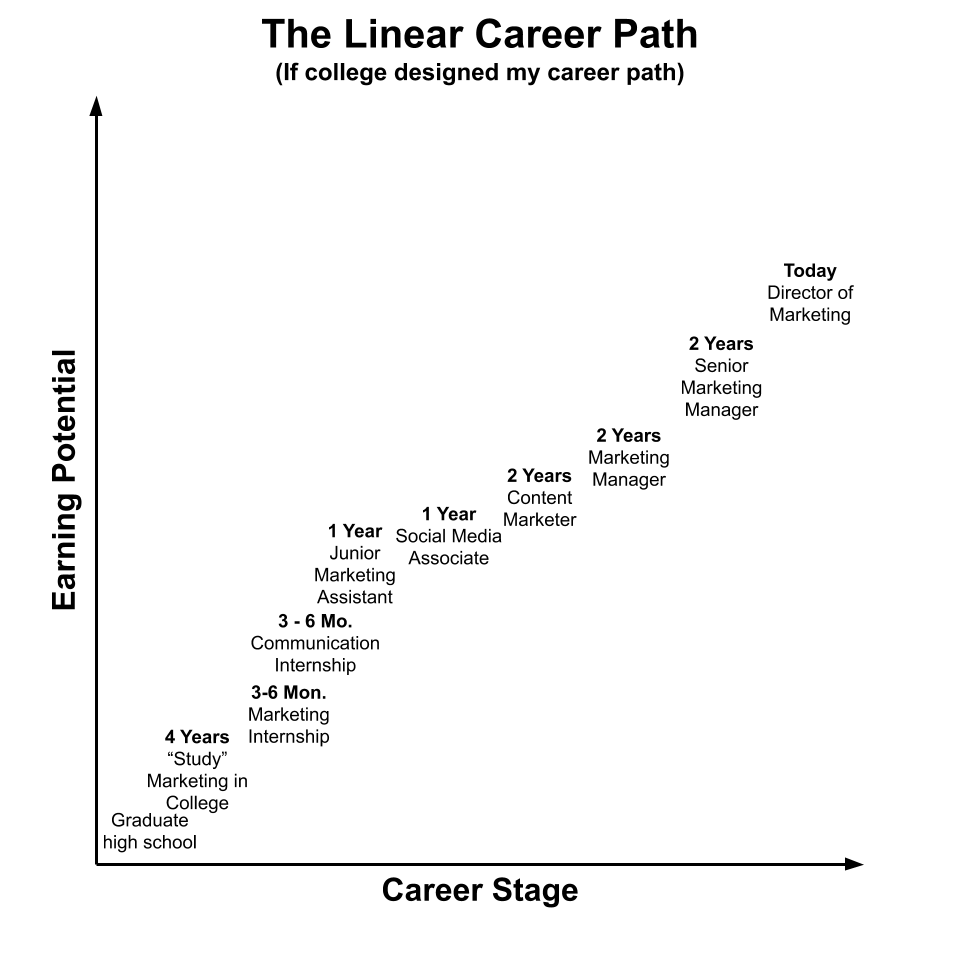
But college forced this idea of a linear career path. What you studied was what you would become. But that didn’t make sense, either. A bunch of things interested me. And the degree program I graduated in was the one that gave me the best scholarships — it wasn’t a field I wanted to commit to forever. What if my career path didn’t have to make sense?
For the startup folks out there (like me), college was to finding myself like freemium is to finding product market fit.
Because I didn’t have to directly bear the costs of it at the time, it was impossible to understand just how much I was willing to give up to find myself. Contrast that with a meaningful career that pays the bills.
When I was finally on the hook for paying all my bills, you can bet your ass I wasn’t waiting around to get a job. Any job.
All of the jobs I worked made me realize just how far I was willing to go to discover a job that didn’t make me feel dead inside and still paid the bills. But college shielded me from those realizations. In other words, until I started running tests in the real world (actually trying to make money), it was impossible to get real, useful feedback about what I did and didn’t enjoy doing.
So, what does that mean for you? Well, here’s the easy part.
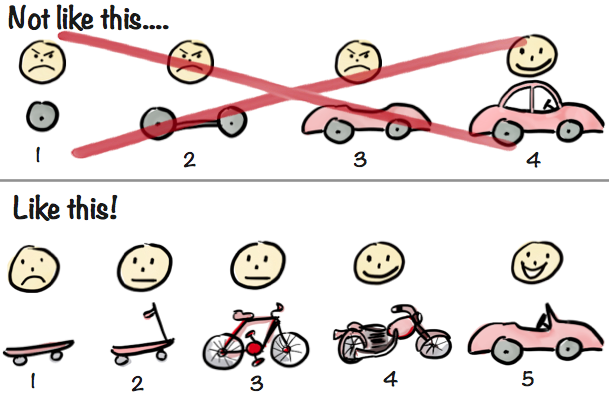
If you already know what you want to do, then good news: whatever it is, no matter how hard or unattainable or intimidating it seems it’s still doable in today’s world.
Today, all you need to understand is the cost of entry for a career. And honestly, it’s much better to understand this out of the gates before you make a huge investment and waste a ton of time. (Read: Getting your CPA before you try accounting).
You’ve got a lot of options to “try before you buy” in most career paths — many weren’t available to most generations before us. So take advantage of that at the onset — no matter what stage you are in your career — before you go try any new career, find the “MVP” version of it. The cheapest, sleekest, easiest, lowest-fidelity version of it and try it on.
If it’s accounting, maybe that means finding an online course and offering to do the bookkeeping for free for a local business. Or landing an internship for a local CPA or an accounting tech company.
Whatever the case, you can get a taste of almost any career path before you order the whole damn entree. And you owe it to yourself to approach your career this way.
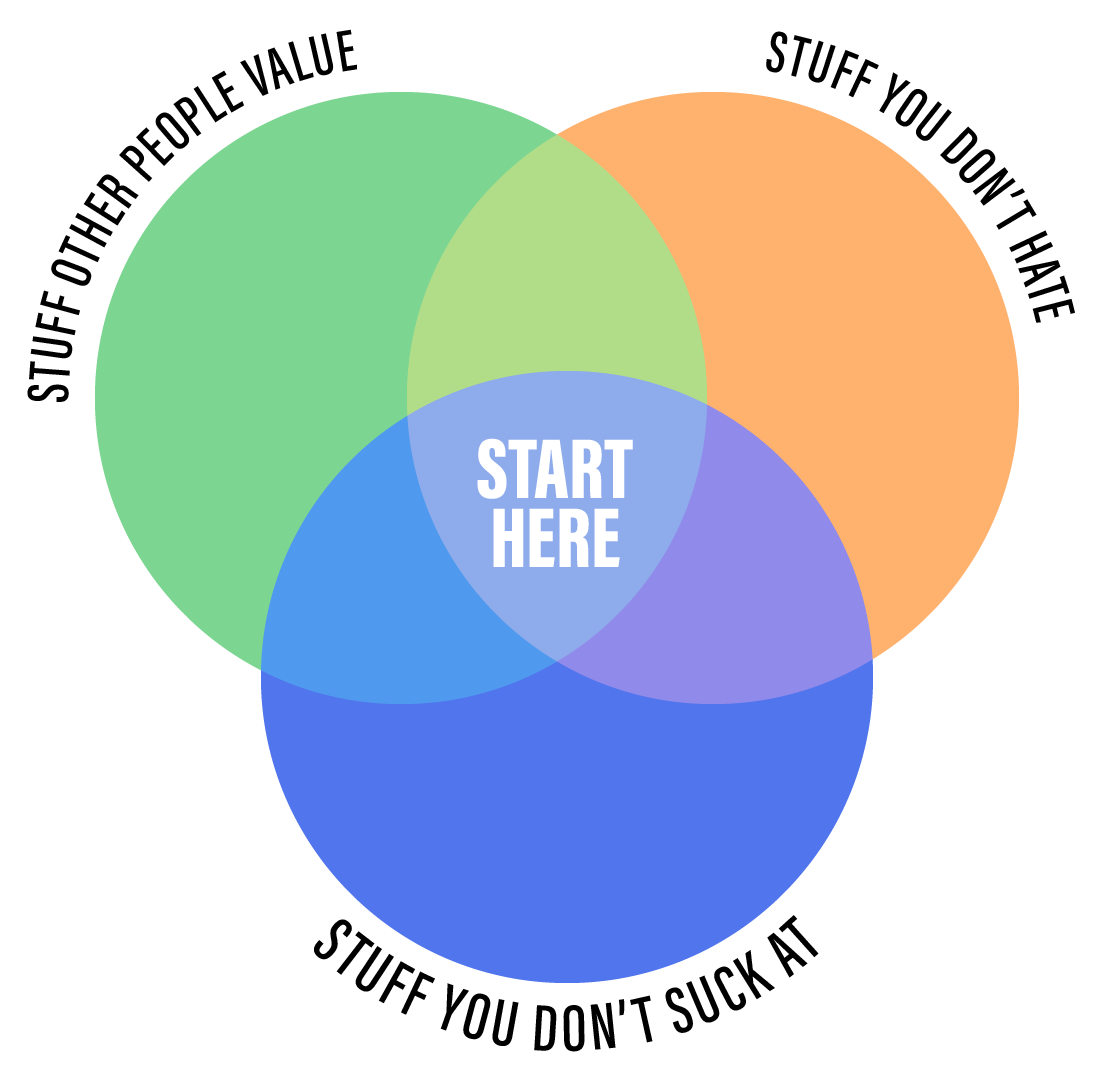
If you don’t already know what you want to do, then here’s some more good news: it’s completely okay to not know.
A lot of people go their whole lives without knowing what they want to do. And instead of getting frustrated about it, they focus on maintaining control of how they spend their time. Rather than worrying about the specific things they do, they optimize their time to avoid the things they don’t want.
So, the quicker you start figuring out what you don’t want, the better armed you are to approach your career. Sounds kinda simple, right?
Well, here’s the not so good news: this takes time and energy.
You’ve got to be willing to try a bunch of stuff. To keep tabs on your progress and be honest with yourself. When you find something you don’t like (give it at least three to six months first and try to get the hang of it, at least), then quit.
But always leave on good terms. Never leave anything up in the air. Be a great employee — regardless of how high or low on the rung the job seems. Go above and beyond to make sure there’s someone behind you to take over anything you had ownership of — do this, and you’ll find your career blows wide open for you.
…Okay, now I know how I should approach my career, but really, tell me where should I start if I don’t know what to do and I want my first career job?
There’s not really any one-size-fits-all answer. You getting the hang of that yet? But, there is some more good news in store for you.
If you just graduated college without a job and don’t know where to start your career, then I’m going to tell you about two of the absolute best jobs you can have right out of the gates.
If I could recommend only one job for you to start your career, it would be a job in customer support or sales. That’s it. Sounds glamorous, right? Wrong. Chances are it’s not. These are hard jobs. Grueling jobs. But by no means jobs to scoff at. They are critical to the function of any good business — and they’re an absolute treasure trove of experience and training for anyone early in their careers.
Bonus points: Don’t just look for jobs in sales or customer support. Look to land a role like that in a hyper-growth startup company.
Not only does starting your career in sales or customer support set you up for tremendous early career success, but working at a startup amplifies that by 10x or more. Especially if you can be one of the first hundred employees.
So, what’s so great about customer support and sales jobs? And why is working at a startup so great for my career?
First things first — customer support and sales jobs are what I call highly-leverageable jobs early in your career. These two job types offer you maximum exposure to the business with the most transferable skill sets to other roles.
How?
Both sales and customer support function primarily as customer-facing roles, which means you need to get smart fast about what your company does, what it sells, who your customers are, who your competition is, and why it matters.
Sure, a lot of other jobs expose you to the ins and outs of the business — but none get you in the trenches quite like sales or customer support. But most other functions are several degrees removed from direct customer interaction.
Direct customer interaction gives you huge leverage to understand how your company can better satisfy its customers. This will force you to hone your soft skills, like communication, empathy, and problem-solving. Not to mention expose you to different software and tools that will prove useful in other roles later on.
Both customer support and sales offer a tremendous head start as a first “career” job — and you can’t go wrong with either.
So, why should you work at a startup early in your career?
Let’s start with a quick outline of different company types and their features:
Startups
- Early-stage startups tend to be under 50 employees
- Venture funding-backed
- Willing to be risky
- “Move fast and break things”
- Testing mindset
- Trying to grow as quickly as possible.
- Highest upside for your career (more on this later)
Later-stage startups
- 500–1500 employees
- They’ve found a product that works and a market that wants it
- Trying to capture as much of the market as possible. Still in growth mode, but trying not to break revenue streams
- Great place to learn, work on large products
Unicorns
- A unicorn is a startup company valued at over $1 billion.
- Companies/Industries becoming major players already
- Thousands of employees
- Facebook, Google, Amazon, some newcomers like Stripe.
- Lots of structure, huge companies, but still embody the testing mindset
SMBs
- SMBs represent small and midsize businesses
- Fewer than 500 employees
- Usually region-specific
- You have more access to the CEO, they are more nimble than corporations, but they tend to take fewer risks than high-growth venture-backed startups
Corporate
- Think Fortune 500
- General Motors, GE (General Electric Company), Comcast, Disney
- Highly-defined structured
- You might be interested in companies like this if you are motivated by titles, defined benchmark bonuses, etc.
Non-Profits
- St. Jude’s Children’s Hospital
- Charity:Water
- American Cancer Society
- Mission-driven, more difficult to move out of later in your career.
So why are startups the best place to launch your career:
- Startups tend to grow quickly — which means high growth upside for personal and career development.
- You will learn and develop skills in a short period of time by necessity and exposure.
- You can easily move between startups. There are a lot of companies doing similar things and most roles have similar skill sets.
- The talent pool: you’ll work around a lot of really smart people that will challenge you to grow.
- A lot of the people you work with will go on to start their own companies or work at other cool companies — (hint: keep in touch)
- You have low expenses when you are young, so you can take a low salary, which lowers the risk of the startup hiring you.
- If you prove yourself for two years, you’ll gain a ton of leverage to choose what’s next.
But those are just a handful of reasons why. The list goes on and on…
Okay, okay, okay, now I know which types of jobs I should look for, but how do I even go about getting a job like that at a startup? Isn’t getting hired at startup hard? It seems really intimidating.
First — yes and no. It’s a lot like getting hired at any business: it’s 99% about presentation. Not only how you dress, speak, and communicate, but how you market your willingness to go above and beyond for the business and demonstrate your ability to learn anything on the fly. If you can do those things, then you’re automatically in the top percentage of anyone applying.
So, how do you go about doing that? Because you gotta land the interview first, right? Well, maybe, but not technically.
There are a lot of ways to get noticed. Think of it like dating. You could get on all of the latest dating apps (this is a lot like applying to jobs online just like everyone else). Or, you can go old school and try the face-to-face approach. You can also do a little background research to take yourself to the next level before you even show up.
Here’s the process I recommend:
- Start by finding a handful of companies you really like, that have a role similar to the sales or customer support role.
- Then jump on their career page and Linkedin. Go figure out who hires for that role. The exact person.
- Now, do some research about the company. Who are their customers. What is their product. What is the pricing. Who are their competitors. What can you tell about the company, it’s customer satisfaction, and the culture all from your online research.
- Put together a brief list of questions you have about the company and in particular, the role you’re interested in (questions you couldn’t find the answer to online).
Now, go find that person again. Shoot them a quick message. Example below.
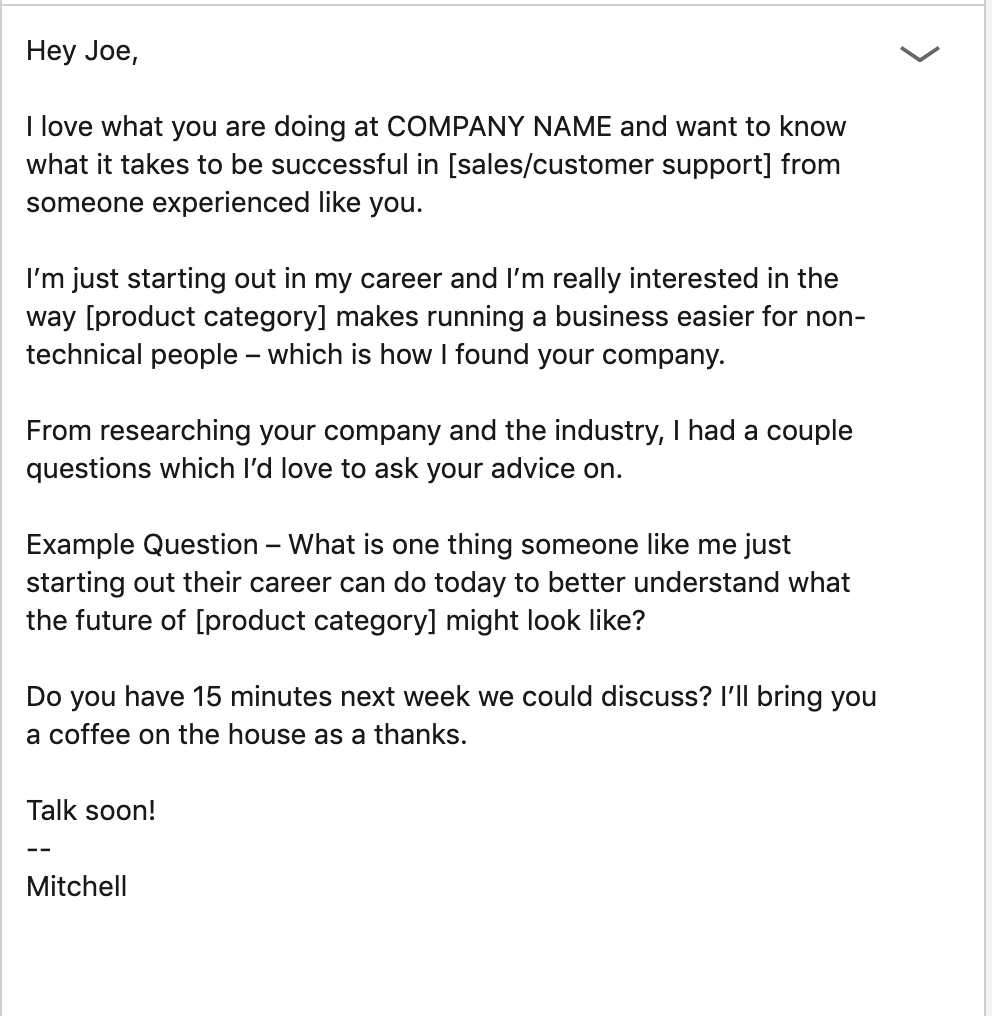
—
So, what do you do once you get the meeting?
Well, first of all be proactive and send the person a calendar invitation for the event so they don’t have to. Make it editable in case they have to include anyone else (like building security or HR). Then, get prepared.
Get a thank you note and email ready. Get your list of questions ready. Figure out what people wear to work there (then dress just a little bit nicer). Show up 10 minutes early if in-person. If it’s on the phone, call them one minute before the scheduled time (not sooner, not later).
And have your questions ready. Don’t focus on asking all of them. Instead, focus on having a conversation, learning as much as you can, and being thoughtful with the questions you ask.
You may learn some stuff that helps you ask better questions. Oh, and take notes. BUT, be sure to ask them about the role specifically. And express your interest (if you’re genuinely interested still) — then ask them exactly what it would take to be considered for the role. Don’t worry if they say some kind of qualification you don’t have.
When the call (or meeting is over) thank them for the time — AND TELL THEM YOU WILL FOLLOW UP.
Then, follow up. Exactly like you said — but more. Send them an email thank you within a few hours — and any additional follow up questions (limit this to 2–3 MAX for now).

And here’s where you really win it:
Drop a handwritten thank you in the mail (next-day air these) to anyone you interacted with (the person you spoke to, and anyone else — like security or HR). AND — then put together a tailored pitch.
Then, using all of the information you learned in your research and conversation, hone in on a few specific things you could do to succeed in the role.
Examples include:
– For sales, I compiled a list of 50 potential customers and found contact information on them.
– For customer support, draft 3–5 different customer service responses or survey templates that could be used. (Or a plan to survey customers, which survey tool to use, which customers to send it to, and follow up action items with customers based on their responses).
Then, the pitch.
Put your list of soft skills, work or relevant experience to-date, links to your social profiles, and your projects all together. Send them another short email — and officially throw your hat into the ring.
Time this so that it’s clear you put actual effort into this. In other words, it should take more than 1 hour, but more than 48 is way too long.
THEN…wait. (But not too long)
There’s a very high chance you’ll hear back same day. If you get a response within 48 hours, send a quick but polite follow up message. And if you still don’t hear anything, you can always take to other more aggressive tactics (like tweeting at the company or the person).
But occasionally, you won’t ever hear back — when that happens, don’t sweat it. Because here’s the key — you just created a process for standing out. Which you can repeat elsewhere.
Whether they hire you or don’t, you built some great social capital for cheap. You learned a lot about a business, an industry, and some useful information about the role.
Now, you can repeat this at the next company — but you’ll already be even more prepared. And compared to the average candidate, you’ll look like a seasoned vet.
Yes, hopefully it leads to a job offer. But at the end of the day, this is just one more experiment you can run to help you gain experience and get closer to understanding what kind of work you’d enjoy.
Because if you’re like me, a job that just pays the bills isn’t good enough. No — I want work that makes me come alive.
And I tried all of the above to find it.
So what are you waiting for?
P.S. — If you’re just starting out and still feel lost about how you should start with your career, email me Mitchell@discoverpraxis.com or leave a note in the comments. I want to hear from you.
That’s it. Good luck. And thanks for reading.
